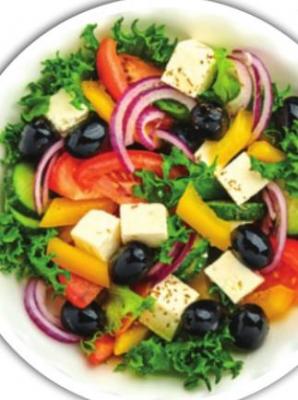Mediterranean Diet Pattern for Health
If you’re looking for a healthy way to eat, look no further than the Mediterranean Diet. It’s healthy, environmentally friendly, flexible and perhaps the most healthful way to eat.
May just happens to be International Mediterranean Diet Month, a great time to investigate the health benefits of the Mediterranean way of eating. It’s the traditional dietary pattern of Greece, Italy and other countries surrounding the Mediterranean Sea. The pattern focuses on whole grains, vegetables, legumes, fruits, nuts, seeds, herbs and spices with olive oil as the main source of fat. Fish, seafood, dairy and poultry are included in moderation; red meat is eaten once a week.
Following the diet plan has shown in studies a reduced risk of cardiovascular disease, diabetes, dementia, several types of cancers, rheumatoid arthritis and osteoarthritis.
The Mediterranean Diet represents the gold standard in preventive medicine, according to the journal Current Opinion in Clinical Nutrition and Metabolic Care’s Nov. 2016 issue. Since then, it’s been one of the most studied eating patterns. The journal credits the diet’s harmonic combination of many elements with antioxidant and anti-inflammatory properties, which overwhelm any single nutrient or food item. The study, called Predimed, was the first randomized trial showing that an intervention based on changes in dietary pattern can reduce the risk of breast cancer and improve cognition.
Here’s how to get started:
No. 1: Choose a wide variety of fruits and vegetables, beans, grains, nuts and seeds daily.
No. 2: Add small servings of olive oil, eggs, cheese and yogurt.
No. 3: Add fish and seafood, poultry and occasionally, red meat.
No. 4: Focus on fresh, unprocessed ingredients.
No. 5: Be physically active and enjoy meals with others.
No. 6: If you drink wine, have it with meals.
No. 7: Drink plenty of water.
Q and A
Q: Should I take an antioxidant vitamin?
A: The antioxidant vitamins include vitamin C, vitamin D, vitamin E and beta carotene, a precursor to vitamin A. However, studies have found just taking vitamin E, vitamin D or beta carotene supplements did not result in any measurable benefit, and in some cases, high doses of antioxidant vitamins were associated with adverse effects. What is effective is eating more fruits, vegetables, nuts, seeds, legumes and whole grains in place of sugary, salty and refined carbohydrate foods and processed meats. Foods that are naturally high in vitamins, minerals and phytochemicals also tend to be rich in fiber and unsaturated fats while being low in saturated fat. Focus on an overall healthy dietary pattern rather than individual nutrients.
RECIPE
Here’s a recipe to get you started with the Mediterranean pattern. It’s from Today’s Dietitian magazine.
GREEK GRILLED CHICKEN WITH SPINACH AND TOMATOES
Servings: 4
4 (6-ounce) boneless, skinless chicken breasts
2 tablespoons olive oil, divided
1/4 teaspoon salt, divided
1/4 and 1/8 teaspoon pepper, divided
1 (14-ounce) can fire roasted diced tomatoes, no salt added
1/4 cup pitted Kalamata olives
5 ounces baby spinach
1/4 cup crumbled feta cheese
Season the chicken breasts with 1 tablespoon olive oil, 1/4 teaspoon salt and 1/4 teaspoon pepper. Grill chicken for about 7 minutes on each side, until an inserted thermometer reaches 165 F. Place cooked chicken on a clean dish and set aside. Meanwhile, heat a large skillet over medium-low heat. Add the remaining 1 tablespoon olive oil to coat the pan. Then add the diced tomatoes and olives and cook for about 3 minutes, stirring often. Add the spinach, 1/8 teaspoon salt and 1/8 teaspoon pepper and continue cooking, stirring often with tongs, until the spinach is wilted, about 5 minutes. Divide the spinach mixture into 4 servings, then top each serving with 1 grilled chicken breast and 1 tablespoon feta cheese. Serves 4.
Per serving: 350 calories; 41 grams protein; 7 grams carbohydrate; 16 grams fat; 2 grams fiber; 430 milligrams sodium.
Charlyn Fargo is a registered dietitian with SIU Med School in Springfield, Illinois. For comments or questions, contact her at charfarg@aol. com or follow her on Twitter @ NutritionRD. To find out more about Charlyn Fargo and read features by other Creators writers and cartoonists, visit the Creators website at www.creators.com.

